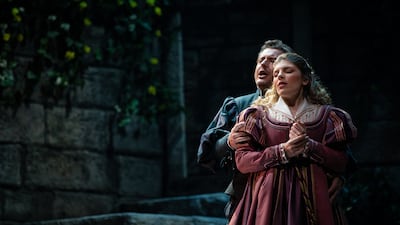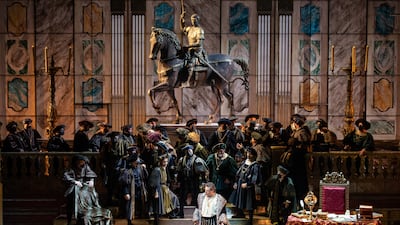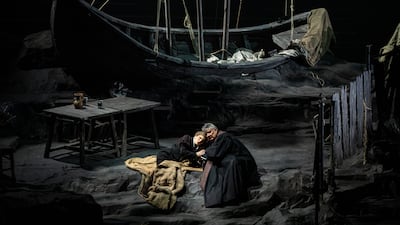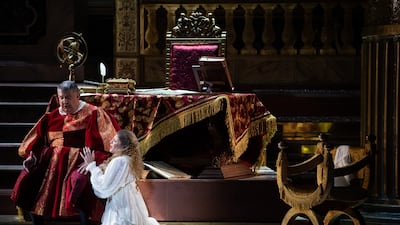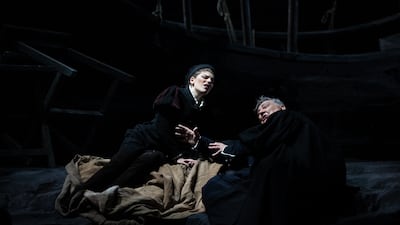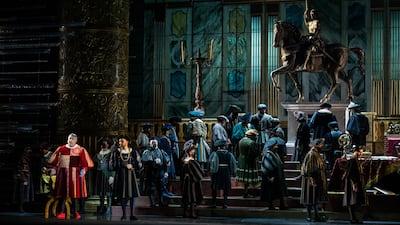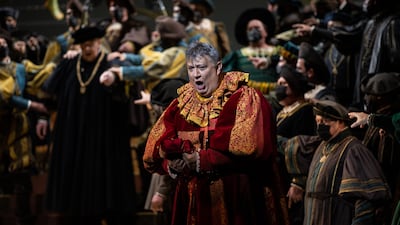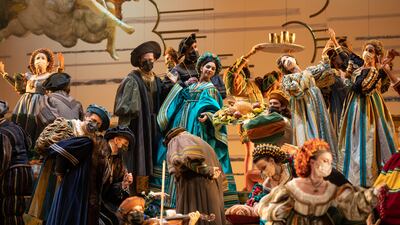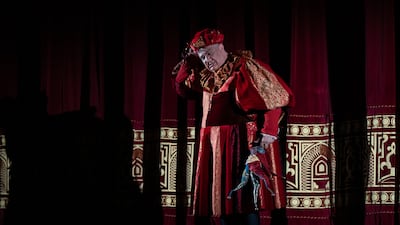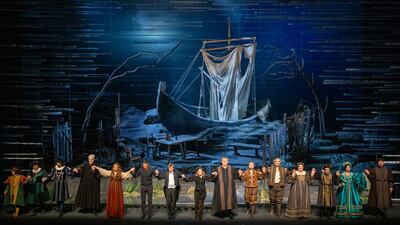Franco Zeffirelli continues to make his presence felt more than two years after his death.
The acclaimed Italian stage and film director was working on a new version of Verdi’s Rigoletto for the Royal Opera House Muscat when he died in 2019, aged 96.
Although Zeffirelli's condition worsened over the last decade of his life, his adopted son and collaborator Pippo describes his death as a shock.
"He hated the idea of dying because he was a man constantly thinking about the future," he tells The National. “It was really towards the last two months he understood his body was abandoning him and that was a psychological blow.
“He was furious with the idea of abandoning life because he had so many things he wanted to complete."
A lavish take on a classic

One of those projects is Rigoletto, made in celebration of the Royal Opera House Muscat's 10th season. A co-production with Italy’s Fondazione Arena di Verona, it had its world premiere at the venue on Thursday, and will run for two further performances, on Friday and Saturday.
The production is trademark Zeffirelli: the story’s traditional telling is offset by eye-popping stage design, detail and grandeur. The palace of the Duke of Mantua is lavish, with its spiral staircase and majestic horse statue, while the home of assassin Sparafucile is suitably forbidding, with its discarded rocks, grime and weathered furniture.
Baritone Ambrogio Maestri in the title role and soprano Giuliana Gianfaldoni as Gilda lead a pan-European cast in delivering kinetic performances full of vibrant movement and the occasional flinging of furniture in murderous rage.
The project was a labour of love for Zeffirelli owing to the sentiments attached. It would have marked the director’s first production in Oman since his staging of Puccini’s Turandot for the opening of the opera house in 2011.

“Zeffirelli always chose his projects carefully and that became even more important with his health declining,” Pippo says. “The decision to come back to Oman was because he believed in the mission of the venue. I remember going with him to the venue while it was being built and after seeing it he understood the vision by the late Sultan Qaboos to educate his people about classical music.
“It was the same motivation with Rigoletto and he made the physical sacrifice of going ahead with the project.”
It’s all on paper
Pippo describes the director’s working process as meticulous.
A painter and trained architect, Zeffirelli designed his trademark opulent stages through hundreds of detailed sketches, including the position of the actors, the lighting design and costumes.
Such a deep dive resulted in the eventual production process going relatively smoothly.
“It's a process similar to studying,” he says. “He needed to have the vision of the stage in his head fully realised and to work out any possible problems beforehand.
“That way, once the show moved to the production process, it was done efficiently and with no time wasted.”
Those detailed notes became the blueprint Stefano Trespidi followed in his official role as “director collaborator”.
Pippo took on the delicate role of adviser, drawing on his intimate knowledge of Zeffirelli’s sensibilities to provide insight to the production’s creative team when needed.
When The National attended a dress rehearsal on Tuesday, Pippo sat alone in the theatre and took detailed notes. Only at the end of the session did he approach Trespidi in the control booth to share his thoughts.
Pippo admits its a role requiring a deft balance.
"Everyone, involved is doing a great job and assistant director Trespidi is very good," he says. "Occasionally, when I am in rehearsals, I will give small indications here and there but, at the same time, I don't want to invade or interfere with his work."
Keeping the legacy alive
Rigoletto is set to begin touring internationally later in the year, with dates to be announced soon, but the production is not the last opportunity fans will get to experience Zeffirelli’s work.
Pippo confirms more operas are in the works based on the copious notes, sketches and visual documents left behind. Many of these can be seen at Florence's Fondazione Zeffirelli, home to the Library of Fine and Performing Arts, which contains more than 300 original sketches and 10,000 documents and books from the director’s personal library.
“I am very happy that students and people from different walks of life have been visiting the foundation,” Pippo says. “Because the message here transcends art. Even into his advanced years, Zeffirelli was also studying and researching and ultimately trying to update himself.
“That applies to anyone who wants to have a successful life.”
With such a legacy, Pippo says he is able remember his adopted father at his peak rather than the final moments.
“I know I am already blessed to have a privileged life being with this great man for over 50 years,” he says. “My mission now is to continue fulfilling his vision and there are still so many things left to do.”
Rigoletto runs at the Royal Opera House Muscat on Friday and Saturday, January 21 and 22. Tickets start at Omani rials ($39). More information is available at rohmuscat.org.om
